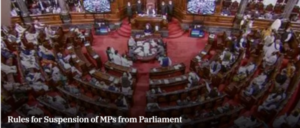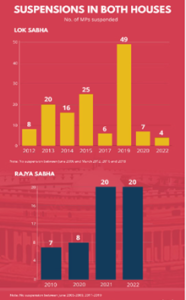No Case to Press.
Relevance
- GS Paper 2 Separation of powers between various organs dispute redressal mechanisms and institutions.
- Parliament and State legislatures—structure, functioning, conduct of business, powers & privileges, and issues arising out of these.
- Tags: #MP #suspension #loksabha #parliament #democracy #upsc.
Why in the News?
The recent suspensions of MPs from Parliament have been met with criticism from many quarters.
Suspension of MP
- The Speaker of the Lok Sabha and the Chairman of the Rajya Sabha are Presiding Officers responsible for maintaining the decorum of the House.
- They have the authority to take action to ensure proper proceedings.
- Authority includes compelling a member to leave the House or suspending them.
- Suspension is aimed at ensuring effective handling of parliamentary business.
Reasons for MP Suspension
The suspension of MPs arises from their disruptive behavior during House proceedings, causing disorder. This disruption is attributed to several factors:
- Time Constraints: MPs lack sufficient time to address important matters.
- Government Indifference: Treasury benches may adopt a retaliatory stance, contributing to disorder.
- Deliberate Provocation: Some parties intentionally incite commotion for political or publicity gains.
- Lack of Accountability: Delayed action against disruptive MPs hampers parliamentary processes.
These interruptions impede urgent discussions, impacting Parliament’s efficiency. For instance, the 16th Lok Sabha (2014–19) lost 16% of its allotted time due to disturbances, as per the PRS report.
Examining the Nature of Suspension
- Suspension of members from parliamentary proceedings is a significant disciplinary action meant to address disruptive behavior and ensure the smooth functioning of the House.
- It serves as a last resort, to be utilized when other means of maintaining decorum and conducting business have failed.
- The suspension empowers the House to temporarily disqualify a member from attending meetings and participating in discussions.
Rules Governing Suspension
Rules for Lok Sabha
- Rule 373 – Eviction for Disorderly Conduct
Stated in Rule Number 373 of the Rules of Procedure and Conduct of Business for Lok Sabha, this rule authorizes presiding officers to instruct an MP to leave the House due to unruly behavior. The rule dictates that the member instructed to leave must remain absent for the rest of the day’s session.
- Rules 374 and 374A – Addressing Persistent Non-Cooperation
Rule 374 – Identification of Disruptive MPs: If an MP persists in disrupting House proceedings despite repeated admonitions, Rule 374 confers authority upon the Presiding officers to identify them.
Rule 374A – Automatic Suspension: Encompassed within the Rule Book in December 2001, Rule 374A aims to bypass the necessity of pursuing a suspension motion.
Under this provision, the Speaker can designate an MP for automatic suspension, lasting either five days or until the session concludes, depending on the shorter duration. It should be noted that the House retains the prerogative to terminate such suspension at any point, through a proposed motion.
Rules for Rajya Sabha
- Rule 255 – Ejection for Disorderly Conduct: Within the Rule Book of Rajya Sabha, Rule 255 bestows authority upon the Chairman of Rajya Sabha to promptly instruct any Member to depart from the House in response to disorderly behavior.
- Rule 256 – Naming and Suspension: Rule 256 endows the Chairman with the power to identify members who persistently undermine the Chair’s authority or misuse the Council’s rules.
Following this identification, the House has the option to put forth a motion to suspend the Member for a period not surpassing the remaining duration of the ongoing session.
Unlike Lok Sabha, it is noteworthy that Rajya Sabha cannot suspend its members without formally passing a motion to that effect, as outlined under rule 374A of Lok Sabha.
Terms of Suspension
- Duration of Suspension: Suspension can last up to the conclusion of the ongoing session.
- Restricted Chamber Access: Suspended members are barred from entering the chamber and participating in committee meetings.
- Discussion and Submission Exclusion: Suspended individuals cannot submit notices for discussion or presentation.
- Question Reply Forfeiture: Their entitlement to receive responses to their questions is forfeited.
Judicial Review of MP Suspension
- While Article 122 of the Indian Constitution shields parliamentary proceedings from court challenges, there have been instances of judicial engagement in legislative procedures.
- For example, the Maharashtra Legislative Assembly’s 2021 Monsoon Session saw a motion to suspend 12 BJP MLAs for a year.
- In this context, the Supreme Court examined the case and ruled that the resolution’s validity extended solely for the remainder of that session.
Issues arising from recent Suspensions
- Recent suspensions of Members of Parliament (MPs) have sparked concerns over the grounds and duration of these actions.
- The suspensions, which have reportedly been extended indefinitely, have attracted attention due to allegations of procedural irregularities and violations of constitutional principles.
- The practice of suspending MPs for an indefinite period contradicts the usual understanding that suspension is meant to be a temporary measure, serving as a deterrent to disobedience.
Balancing Discipline and Representation
- While maintaining discipline within the legislative houses is crucial, it is equally important to ensure that disciplinary actions do not infringe upon the democratic representation and participation of elected members.
- The use of suspension should strike a balance between upholding the integrity of parliamentary proceedings and safeguarding the rights of elected representatives.
- Opposition members should play a constructive role in Parliament and they should be allowed to put forward their views and express themselves in a dignified manner.
It is imperative for the Houses of Parliament to revisit and clarify the principles guiding the use of this disciplinary tool. The overarching aim should be to ensure that suspensions are just, proportionate, and aligned with the constitutional framework.
By striking a harmonious balance between maintaining order and upholding democratic principles, legislative houses can effectively navigate the challenges posed by disruptions while upholding the essence of representative democracy
Sources:
https://epaper.indianexpress.com/3749926/Delhi/August-18-2023#page/1/1
Laxmikant
Mains Question:
Q The Indian Constitution has provisions for holding joint session of the two houses of the Parliament. Enumerate the occasions when this would normally happen and also the occasions when it cannot, with reasons thereof. (2017) 250words.





